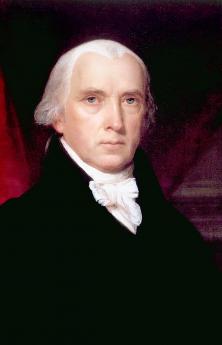Related Topics
...Trying Out the New Constitution
George Washington's first term as President was much like a continuation of the Constitutional Convention, with many of the same participants.
Publius (James Madison) Explains the Proposed Constitution

|
| Publius (James Madison) |
New York's ratification of the Constitution could expect a close vote, so Alexander Hamilton organized the publication of The Federalist Papers to drum up support. He recruited two allies, James Madison and John Jay, to assist under the pen name of "Publius". Federalist # 10 was written by James Madison and is often spoken of as containing the central organizing theme, which is that larger nations are harder to dominate by political parties ("factions"), and hence a single strong Union of thirteen was more stable than a loose confederacy of many small nations. At about the same time, George Clinton was publishing Anti-Federalist Papers under the pen name "Cato", opposing ratification. Clinton argued that small homogeneous nations were less likely to split internally than bigger ones who already had more conflicting viewpoints. Both arguments are somewhat true, of course. Which argument you prefer depends on which kind of splitting you predict. Federalist # 10 has also been read as explaining the absence of political parties in the Constitutional plan, but a careful reading is convincing that Madison was saying political factions were deplorable but inevitable, not that they would never arise. Failure to mention them in the Constitution may have grown out of reluctance to expand debate, or else reluctance to give political parties some status they had not fought for.
Since it would be necessary for the state legislatures to ratify the Constitution, the arguments Madison could use before the vote were necessarily conciliatory, conceivably even somewhat contrived. However, since "Federalism" was settled early in the Convention (Madison's notes put it at June 21), it was the cornerstone around which everything else was built. By the end of the Convention in November, it no longer mattered whether the arguments of Federalist #10 were sincerely Madison's views or not; they had been adopted by the Convention as its own.
Few delegates at the convention needed to argue that a bigger nation was better. The Delegates had usually been selected to improve the Articles of Confederation, not to defend them. In the ratification process that would not be the case. The wisdom of getting bigger had to be confronted and balanced against the increased risk of falling apart. Centuries later, it is not certain why Colonial America then believed the advantages of the union had grown more attractive than the risks. Or why kings were suddenly so undesirable; at the time, all nations had kings. The easiest assumption to make is that discovery of the New World continents was itself the main reason relative risks seemed reversed; cheap land and abundant resources lessen the reasons to envy them. Hard experiences have since tempered the enthusiasm of America for that notion, but a succession of new challenges replaced it. The Industrial Revolution offered new rewards, but also new ways to control them. A century of expanding frontiers repeatedly did the same thing. Industrial power led America to a brief fantasy of Manifest Destiny. The atom bomb provoked mutually assured destruction to restrain it. Even today, the computer revolution presents new opportunities for wealth while supplying electronic remedies for brute power. Madison's theme has adapted and persisted. America has been fairly consistently able to devise sources of new wealth and to match them with new ways of maintaining stability. Usually, the new challenge will require new ways to quiet the disruption it causes. Foreign ideas contain a lot of affection for central controls and are to be treated with suspicion until new immigrants get used to our ideas. Immigration must not overwhelm our power to resist the ideas we abandoned in 1787. The secret formula for resisting dictatorship seems to be no more than a grim determination to resist it, no matter what, combined with the spreading realization that somehow in the past, that grim determination has been all it took.
To repeat: As nations grow larger, they do indeed grow harder to govern and some will look for strong monarchs to control them. But America stumbled on another way. In mild cases, persuasion may be enough; just read some history. Sometimes the persuasion can be sly, even contrived. But ultimately, the frontiersman will defend his cabin by himself, and make his own rules to do it if he must. Well before Madison was on the political stage, after fighting against monarchy for many years, America was having no more monarchy. The mere mention of it made George Washington grow livid. So Madison was really claiming we had here a safe way to enlarge the nation without resorting to tyranny. If we somehow got too big, we could always split apart along older boundaries. When the Civil War showed that approach wasn't nearly as peaceful as we hoped, it was at least preferable to returning to a monarchy. As long as a country firmly believes anything is preferable to monarchy, monarchy won't stand much chance.
Originally published: Tuesday, March 27, 2012; most-recently modified: Monday, June 03, 2019